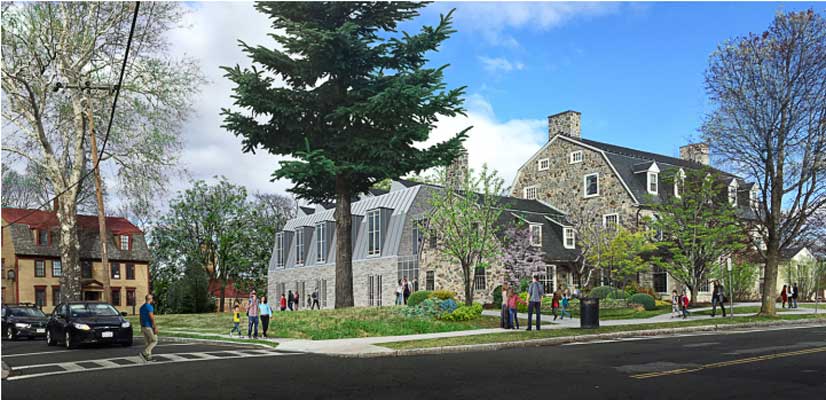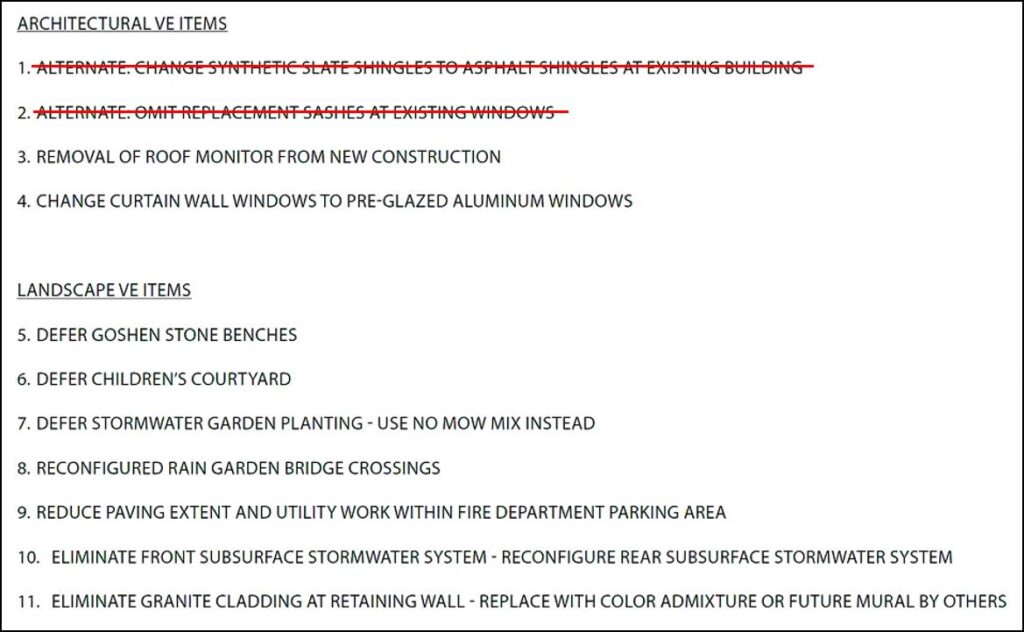Library Project Gets by Historical Review with a Little Help from Its Friends

Amherst Historical Commission Nixes Asphalt Roof, Window Repairs
Amidst complaints that they were ignoring advice from the Massachusetts Historical Commission (MHC), the Amherst Historical Commission (AHC) voted 3-1 to declare that recent cost-saving cuts to the design of the Jones Library Demolition-Renovation-Expansion “meet the [Town-Library] Preservation Restriction standards and comply with the Secretary of the Interior standards.”
The commissioners voted to allow the original slate roof to be replaced with synthetic slate but placed a condition that asphalt shingles not be pursued. They also require that the original windows be replaced with historically compatible new windows and not simply repaired.
They voted to allow a hole to be cut into the stonework of the historic building’s main façade to accommodate a book drop.
In 2022 the Jones Library Trustees signed a contract with the Town that requires “replacement, rebuilding, repair and reconstruction of the Building whenever necessary in accordance with The Secretary of Interior’s Standards for The Treatment of Historical Properties with Guidelines for Preserving, Rehabilitating, Restoring and Reconstructing Historic Buildings (36 CFR 67 and 68).”
This Preservation Restriction Agreement also mandates that “the features and characteristics that embody the architectural, historic and cultural significance of the exterior of the Building will be forever retained and maintained substantially in their current condition.”
See related Amherst Historic Commission Rejects State Guidance on Jones Expansion
A number of letters and comments voiced at the public hearing on August 28 which had been continued from August 22 complained that the Amherst Historical Commission had set the bar too low and had not adequately protected one of Amherst’s most cherished historic places. Residents protested that the deliberation only considered recent “value engineering” proposals as the design changes are known, and failed to revisit the October 2023 approval of the previous design iteration at a hearing in which adverse effects to the historic property and violation of the Secretary of the Interior’s standards received only cursory consideration.

Many criticisms focused on a November 2023 letter sent by the Massachusetts Historical Commission to the AHC and Library Director Sharon Sharry observing seven adverse effects to the Jones Library which is listed on the state and national registers of historic places. Subsequent letters from the MHC rejecting the Town’s application for $1.8 million in historic tax credits pointed out the violation of five of the Secretary of the Interior’s standards.
The letter was not made public or posted to any meeting packets until an Amherst Indy Public Record Request revealed its existence. Even the Town Council, which approved an additional $10 million in borrowing for the project in January 2024 and members of the AHC have expressed not being told of the letter. Senior Planner Nate Malloy serves as the staff liaison to the AHC and distributes communications sent to them.
To Rescind or not to Rescind
Acting AHC Chair Madeleine Helmer said, “I do take issue that the (Amherst) Historical Commission was not notified about the MHC letters and this process that was underway. I chaired the discussion of the [library] interiors in January and I did not know that a letter had been received that stated very clearly the MHC’s comments.”
Commissioner Hetty Startup cautioned against discounting the advice of the MHC and pointed out that the vision of the Massachusetts Board of Library Commissioners who have demanded substantial changes to the Jones Library in return for a $15.6 million construction grant are in direct conflict with the standards for historical preservation recognized by the Massachusetts Historical Commission.
“My partners in this as a historical commission member are with the MHC, with the Secretary of Interior standards, and with [National Historic Preservation Act Section] 106, and that’s my background,” she said. Startup urged the AHC to rescind its fall 2023 approval of the design in light of the MHC’s guidance, and to go through the Secretary of the Interior’s standards step by step,
Startup’s proposal was countered by the Planning Department’s Malloy who advised listening to the Town’s lawyers.
“I spoke with the town attorney again. There had been some discussions about how obligated are we to follow what Mass Historic had done and do we need to enumerate every standard in the preservation restriction as we review it, and that’s not necessarily the case,” reported Malloy.
“I spoke with the town attorney again. There had been some discussions about how obligated are we to follow what Mass Historic had done and do we need to enumerate every standard in the preservation restriction as we review it, and that’s not necessarily the case,” reported Malloy.
He argued for considering the prior decision a properly done deal, suggesting, “to me, when Mass Historic said that there’s a removal of a lot of façade, maybe they had trouble reading the plans.”
Malloy’s guidance prevailed as the AHC members chose to limit their vote to the value engineering changes without considering the adverse effects found by the MHC. They voted 3 – 1 to approve compliance with the Preservation Restriction Agreement on the condition that the roof design retain synthetic slate shingles and full window replacement. Madeleine Helmer, Pat Auth and Antonia Brillembourg voted yes and Hetty Startup no.
The roof and window conditions imposed by the AHC are in addition to the abandoning of an initial cost reduction design proposal by the trustees to discard historic interior millwork. This past spring an invitation for construction bids resulted in a single bid, $6.5 million over the cost estimate. Project leaders hope to rebid the project in mid-September and receive a bid that brings the total cost under the $46.1 million that has been appropriated by the Town Council. The Jones Library trustees have committed $550,700 from their endowment to pay Finegold Alexander Architects to prepare new value engineered construction documents.


The AHC allowed the book drop in the stone facade of the original 1928 bulding to be kept, because “it increases accessibility”. This makes no sense, since the front door of the library will be accessible in the new plan, and patrons can return materials at the circulation desk when the library is open. The return box near the sidewalk and parking lot is more convenient when the library is closed. Also, putting the book return in the current director’s office would mean that that beautiful space would remain off-limits to the public.
If the expensive, unwieldy book sorter were purchased in the future, the slot could be cut then. It makes no sense to deface the front of the building now.
It makes excellent sense for each Town of Amherst board, commission, and committee to depute a single representative to request advice about its legal responsibilities from Town Counsel.
But what kind of sense does it make to depute a non-member, who is also a non-lawyer, to request Town Counsel’s opinion orally, and to transmit that opinion orally to the board, commission, or committee? Its members then have no record of their query, or of the advice.
OMG! Just what I was wondering about the other night but, sadly, did not articulate well during public comment. For the second meeting in a row, the Planning Board’s liaison to the AHC stated that he (alone, apparently) had consulted with the Town Attorney and was told things that, to me, were not definitive, such as “that’s not necessarily the case.”
So too, the Town Attorney (?) thought that the issues cited in the letters from the state historical commission had been discussed, yet the letters and their contents were not even known about by members of the AHC and others before a critical vote was taken.
Then the liaison, who appeared to me to be acting more in line with being a Chair of the AHC, “…argued for considering the prior decision a properly done deal, suggesting, ‘to me, when Mass Historic said that there’s a removal of a lot of façade, maybe they had trouble reading the plans.’“
This past Wednesday night, 3 of the 4 members of the AHC expressed concerns with their vote taken last fall, suggesting that it should be vetoed. By the meeting’s end, only 1 stood against the advice given by the staff liaison to not do so.
Sarah’s comment reminds me of a similar situation back in the early 2000s, when a former Planning Director presented an oral summary of a legal opinion to the Planning Board — which turned out to be incorrect, and which resulted in a very problematic situation that was not widely known by the public at the time. After this happened, it was requested that legal opinions always be presented in writing to those who needed to know them, but it appears that the Planning Department has once again neglected to follow this wise directive.
It was obvious that the liaison’s message had significant influence on the AHC vote outcome this week.
Members quickly stopped their discussion after his message presentation. Members had started to discuss the possibility of reviewing their October 2023 AHC decision …which they made without knowledge of the state’s MHC input. That information was withheld from members until after the AHC October decision.
Perhaps a Amherst Historic Commission member should ask the town lawyer via writing what are the consequences….besides losing millions of project grant dollars and losing the history in the building… for disregarding historic preservation law. A liason might not be the right person to do this research.
To paraphrase Upton Sinclair:
It is difficult to get a liaison to advise reconsidering something when his salary depends upon not reconsidering it.
And to where does that lead…?